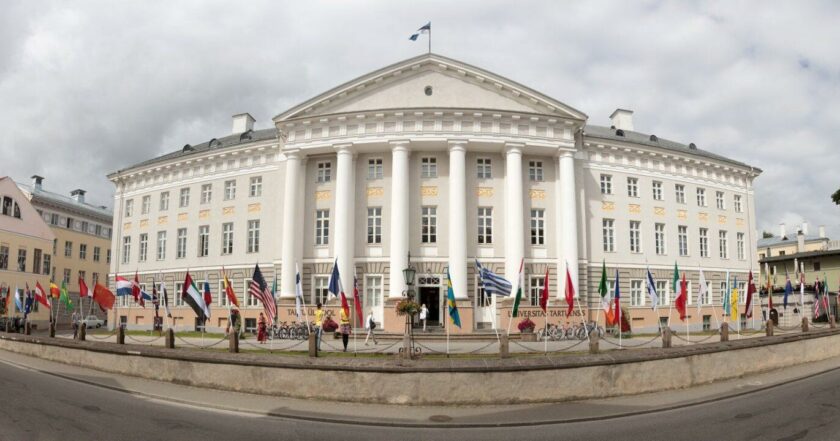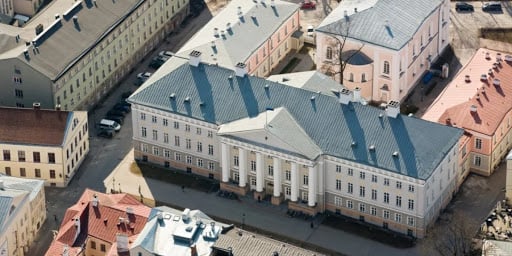Studying abroad during a pandemic: what EU educational opportunities are available to Ukrainians
Classic and informal, online and offline opportunities. We explain how coronavirus has changed the educational cooperation between Ukraine and the EU

University of Tartu
More than a year has passed since the beginning of the pandemic and imposed restrictions. Coronavirus has changed many areas of our lives, and what seemed impossible a year ago has long been the norm. It was the same with education: in March 2020, no one could've imagined that school and university classes would be fully and permanently transferred to the online format.
It isn't easy to study online, but it has become even more difficult for those studying abroad and organizing international educational projects. Rubryka decided to find out how educational cooperation between Ukraine and the EU works during a pandemic, and if it's more positive or negative.
Classical university
At the beginning of the pandemic, European universities like Ukrainian ones were forced to transfer their classes to the online space. Currently, the situation with coronavirus infection spreading in many EU countries also doesn't allow for live university classes. Universities had to adapt quickly to the new conditions, and the approach of various universities was different. Although in some European universities, excessive bureaucracy still hinders the purchase of licenses to use Zoom, most European universities are quite flexible in organizing online classes.
A striking example is the University of Tartu in Estonia. The university offers 27 programs in English, and of the 13,000 students studying here, more than 1,700 are foreigners. Many of them are Ukrainians, as the university ranks quite high in international rankings and offers numerous scholarships and favorable admission conditions.
With the onset of the pandemic, the university moved all classes online, quickly deploying the necessary infrastructure. Now students of the University of Tartu listen to lectures and participate in seminars, receive grades and assignments, as well as consult with teachers with no problems.
During last year's admission campaign, the university provided all possible assistance to international students. The university has approached Estonian embassies in various countries to facilitate issuing visas to students, prepared and constantly updated information on entry rules, and arranged transportation for international students arriving via Tallinn Airport and needing a transfer to Tartu. Although the 2020/2021 academic year in Estonia started without restrictions, the university kept the possibility of studying online for those students who, due to certain circumstances, could not get to Estonia on time.
It's most likely that this year, too, international students will retain the option of distance learning and will be encouraged in every way to enter the University of Tartu. The application deadline was extended from 15 March to 15 May for students from outside the EU seeking to study social sciences or the humanities. Therefore, although studying abroad has also changed considerably as a result of the pandemic, this opportunity remains open for Ukrainian students.
Educational activities
If the transition to the online format forced to make significant adjustments to the educational process in classical academic education, then holding various lectures, even in some ways, benefited from the pandemic. Not everyone managed to attend events that used to be held live, and it was difficult to invite interesting speakers. Now, everyone can join such events online, and inviting interesting guests has become much easier.
Hanna Haiduk, a graduate of the Kyiv-Mohyla Academy, founded the Term Paper Tutors project in 2019. The project's essence is to help second and third-year students write their first research papers and do it as correctly as possible. "There are students in universities who don't just want to write a course paper, they want to put their heart into it. In the second or third year, you may not have enough skills, or may not even know research methods," Hanna says.
She's assembled a team of like-minded people who mentor young students and help them formulate and conduct their research correctly. Simultaneously, Hanna organizes educational lectures, to which she invites social sciences professionals, specializing in various research methods. Thanks to this, students taking part in the project can expand their worldview and learn about different ways in which they can make their research more meaningful.
Prior to the pandemic, Hanna had only a few such lectures offline, so most of the lectures, including those involving a speaker from the University of Estonia, had to be held online. Hanna says the project has even benefited from making online activities in a pandemic the norm. Now Hanna plans to develop the project and invite even more lecturers and mentors from various universities in Ukraine and Europe. According to her, the project shouldn't focus only on writing term papers and theses but can bring students together for joint research and co-authored research articles. Although holding such live meetings would have its advantages, inviting foreign speakers online is much easier. "To be honest, I prefer the offline format, when you feel the atmosphere and people. Although I don't see such opportunities with no pandemic, because not all people interested in this project will be able to lecture in Ukraine. I don't think the professor I invited would come to Ukraine just to give 1-2 lectures on interpretivism and interviews as a research method," Hanna concludes.
Non-formal education
Another area that was significantly affected by the pandemic was training, seminars, youth exchanges, and other non-formal education activities. Before the pandemic, Ukrainians were free to travel and attend such events in EU countries. The advantage of non-formal education is that people learn new skills during teamwork, games, and simulations in a relatively short time. The European Commission funds the vast majority of such projects in the EU under the Erasmus+ program. Most often, such events are held among youth and social workers, but the list of topics and participants isn't limited. Besides, you don't need to be a student to participate in such activities, and age restrictions on some of them may not be present at all.
Irena Remestvenski founded the Iskra Center for Dialogue and Reconciliation in 2008. During this time, Iskra has become one of the largest sending organizations, through which hundreds of Ukrainians have participated in youth exchanges and training organized under the Erasmus+ program and beyond. According to Irena, the pandemic was an extremely strong blow for this area: "Currently, almost nothing is happening; live youth exchanges aren't held since the fall. Those projects that have already been approved and planned are postponed; now they're planned for September-October. However, it's unknown at this time whether they'll be held."
According to Irena, 90% of organizations holding such events are still postponing them and still hope to hold them live. In Erasmus+ approved projects, national agencies (institutions that monitor and support such activities) have significantly extended the project dates allowing the planned activities. But the worst thing is no prospect of when things can return to normal, as in other areas of life.
The same events that take place online lose their charm without live interaction. "If you make an ad for online training, no one registers, or they register and then don't come. Out of 30 registrations, 7 people come to the meeting, plus the online format makes it very easy to escape if a person suddenly becomes bored," Irena says.
Online prospects
Although vaccination has already begun in both Ukraine and the EU, a full-fledged opening of borders and resumption of educational activities in the pre-pandemic format isn't expected soon. However, even though some opportunities for Ukrainians were closed because of the pandemic, others could flexibly adapt or even offer something new. Therefore, despite all this, educational cooperation between Ukraine and the EU doesn't stop, and Ukrainians still have the opportunity to join it.
























































